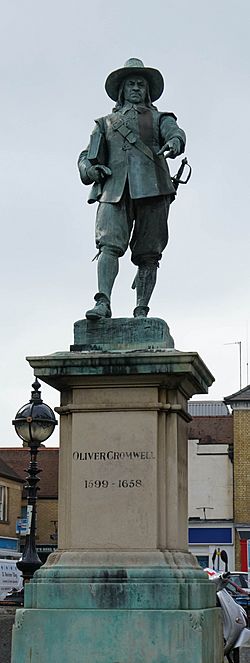Statue of Oliver Cromwell, St Ives facts for kids
Quick facts for kids Oliver Cromwell |
|
|---|---|
 |
|
| Year | 1901 |
| Type | Statue |
| Medium | |
| Subject | Oliver Cromwell |
| Location | St Ives, Cambridgeshire |
| 52°19′24.25″N 0°4′23.72″W / 52.3234028°N 0.0732556°W | |
A statue of Oliver Cromwell stands in the town of St Ives, Cambridgeshire, England. This sculpture shows Oliver Cromwell, who was a very important leader in England's history. He was known as the Lord Protector, a bit like a president or prime minister, for England, Scotland, and Ireland. The statue was created by F. W. Pomeroy and put up in 1901. It is one of only five public statues of Cromwell in the United Kingdom. This statue is also a Grade II listed building, which means it's recognized as an important historical or architectural site.
About the Statue
This statue was carved by the artist F. W. Pomeroy. It shows Oliver Cromwell standing tall and pointing. The statue is placed on three steps made of strong Aberdeen granite. There are also decorative lamps at each corner, making it stand out.
Why St Ives Has This Statue
The idea for a statue of Oliver Cromwell in St Ives came from a historian named Thomas Carlyle. In 1849, he suggested that St Ives would be a great place for it. This was because Cromwell used to live there. Carlyle felt it was important for the town to remember its connection to such a famous person.
In 1899, a nearby town called Huntingdon decided not to build a Cromwell statue. St Ives quickly took this chance to create their own. F. W. Pomeroy was chosen to sculpt the statue. Before it was put up, the statue was shown at the Royal Academy of Arts in London, where it received good reviews.
This statue is special because it's the only one of Cromwell in England that was paid for by regular people donating money. It's also said to be the second most visited and photographed monument in St Ives. The only thing more popular is the town's old bridge chapel on the St Ives Bridge. The statue was officially revealed on October 23, 1901, by a politician named Lord Edmond Fitzmaurice.

